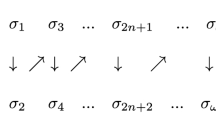Abstract
In “Logical consequence: A defense of Tarski” (Journal of Philosophical Logic, vol. 25, 1996, pp. 617–677), Greg Ray defends Tarski"s account of logical consequence against the criticisms of John Etchemendy. While Ray"s defense of Tarski is largely successful, his attempt to give a general proof that Tarskian consequence preserves truth fails. Analysis of this failure shows that de facto truth preservation is a very weak criterion of adequacy for a theory of logical consequence and should be replaced by a stronger absence-of-counterexamples criterion. It is argued that the latter criterion reflects the modal character of our intuitive concept of logical consequence, and it is shown that Tarskian consequence can be proved to satisfy this criterion for certain choices of logical constants. Finally, an apparent inconsistency in Ray"s interpretation of Tarski"s position on the modal status of the consequence relation is noted.
Similar content being viewed by others
REFERENCES
Etchemendy, J. (1988): Tarski on truth and logicalconsequence, J. Symbolic Logic 53: 51–79.
Etchemendy, J. (1990):The Concept of Logical Consequence, Harvard University Press, Cambridge.
Hanson, W. H. (1997): The concept of logical consequence, Philos. Review 106: 365–409.
Kreisel, G. (1967): Informal rigour and completenessproofs. In: I. Lakatos (ed.), Problems in the Philosophy of Mathematics, North-Holland, Amsterdam, pp. 138–157. Reprinted in The Philosophy of Mathematics, edited by Jaakko Hintikka, Oxford University Press, London, 1969, pp. 78-94. (Page references are to the latter.)
McGee, V. (1992): Two problems withTarski's theory of consequence, Proc. Aristotelian Society 92: 273–292.
McGee, V. (1997): How we learn mathematical language, Philos. Review 106: 35–68.
Ray, G. (1996): Logical consequence: A defense of Tarski,J. Philos. Logic 25: 617–677.
Sher, G. (1991): The Bounds of Logic: AGeneralized Viewpoint, MIT Press, Cambridge.
Tarski, A. (1933): On theconcept of truth in formalized languages. In: (Tarski, 1983), pp. 152–278. (First published in Polish in 1933. Published in German in 1935.)
Tarski, A.(1936): On the concept of logical consequence. In: (Tarski, 1983), pp. 409–420. (First published in Polish and German in 1936.)
Tarski, A. (1983):Logic, Semantics, and Metamathematics, 2nd edn, translated by J. H. Woodger, and edited by John Corcoran, Hackett Publishing Co., Indianapolis. (1st edn published by Oxford University Press, Oxford, 1956.)
Author information
Authors and Affiliations
Rights and permissions
About this article
Cite this article
Hanson, W.H. Ray on Tarski on Logical Consequence. Journal of Philosophical Logic 28, 605–616 (1999). https://doi.org/10.1023/A:1004649130370
Issue Date:
DOI: https://doi.org/10.1023/A:1004649130370




